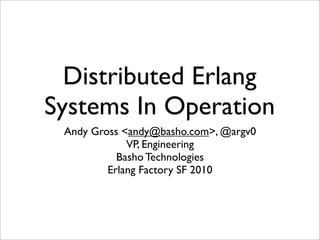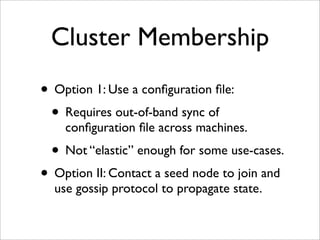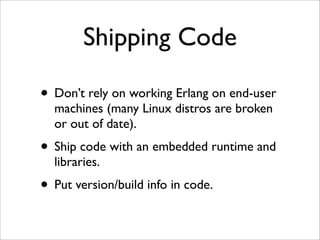Distributed Erlang Systems In Operation
- 1. Distributed Erlang Systems In Operation Andy Gross <andy@basho.com>, @argv0 VP, Engineering Basho Technologies Erlang Factory SF 2010
- 2. Architectural Goals ? Decentralized (no masters). ? Distributed (asynchronous, nodes use only local data). ? Homogeneous (all nodes can do anything). ? Fault tolerant (emergent goal). ? Observable
- 3. Anti-Goals ? Global state: ? pg2/hot data in mnesia ? globally registered names ? Distributed transactions ? Reliance on physical time
- 4. Compromise your Goals ? Decentralized (no masters). ? Distributed (nodes use only local data). ? Homogeneous (all nodes can do anything). ? No distributed transactions/global state. ? No reliance on physical time.
- 5. Systems Design ? Cluster Membership ? Load balancing/naming/resource allocation ? Liveness checking ? Soft Global State
- 6. Cluster Membership ? Option 1: Use a con?guration ?le: ? Requires out-of-band sync of con?guration ?le across machines. ? Not Ī░elasticĪ▒ enough for some use-cases. ? Option II: Contact a seed node to join and use gossip protocol to propagate state.
- 7. Load Balancing and Resource Allocation ? Static assignment ? Round-robin/Random ? Static hashing: Nodes[hash(Item) mod length(Nodes)] ? Dynamo/Riak/Cassandra/Voldemort: Consistent Hashing
- 8. Liveness Checking ? nodes() and net_adm:ping() operations can be too low-level. ? Sometimes youĪ»d like to divert traf?c from a node at the application level while keeping distributed Erlang up. ? Use net_kernel:monitor_nodes() and an app-level mechanism for liveness.
- 9. Soft State/Gossip Protocols ? An eventually-consistent alternative to global state. ? Nodes make changes, gossip to another node. ? Nodes receive changes, merge with local state, gossip to another node. ? Requires up-front thought about data structures, dealing with slightly-stale data.
- 10. Running Your System ? Shipping code ? Upgrading code ? Debugging your own systems ? Living with other peopleĪ»s systems
- 11. Shipping Code ? DonĪ»t rely on working Erlang on end-user machines (many Linux distros are broken or out of date). ? Ship code with an embedded runtime and libraries. ? Put version/build info in code.
- 12. Upgrading Code ? Hot code loading for small, emergency ?xes. ? For new releases, reboot the node. ? Why not .appups? ? Systems IĪ»ve worked on have changed/ evolved too fast. ? A reboot is a good test of resiliency.
- 13. Debugging Running Systems ? Remote Erlang shells are awesome, except when distributed Erlang dies (it happens). ? run_erl (or even screen(1)) give you a backdoor for when -remsh fails. ? rebar (http://hg.basho.com/rebar) makes this easy. ? What if you donĪ»t have access to the box?
- 14. OPS - Other PeopleĪ»s Systems ? Your Erlang, Enterprise ?rewalls. ? Erlang shell is powerful, but scary. ? Provide a debugging module. ? Get data out via HTTP/SMTP/SNMP ? Use disk_log/report_browser.
- 15. Questions? Ī░You know you have [a distributed system] when the crash of a computer youĪ»ve never heard of stops you from getting any work doneĪ▒ -Leslie Lamport
- 16. Resources ? unsplit: http://github.com/uwiger/unsplit ? gen_leader: http://github.com/KirinDave/gen_leader_revival ? Dynamo: http://www.allthingsdistributed.com/2007/10/ amazons_dynamo.html ? Hans Svensson: Distributed Erlang Application Pitfalls and Recipes: http://www.erlang.org/workshop/2007/proceedings/ 06svenss.ppt ? Consistent Hashing and Random Trees: Distributed Caching Protocols for relieving Hot Spots on the World Wide Web: http://bit.ly/LewinConsistentHashing







![Load Balancing and
Resource Allocation
? Static assignment
? Round-robin/Random
? Static hashing: Nodes[hash(Item) mod
length(Nodes)]
? Dynamo/Riak/Cassandra/Voldemort:
Consistent Hashing](https://image.slidesharecdn.com/argef2010-100325150703-phpapp02/85/Distributed-Erlang-Systems-In-Operation-7-320.jpg)







![Questions?
Ī░You know you have [a distributed system]
when the crash of a computer youĪ»ve never
heard of stops you from getting any work
doneĪ▒
-Leslie Lamport](https://image.slidesharecdn.com/argef2010-100325150703-phpapp02/85/Distributed-Erlang-Systems-In-Operation-15-320.jpg)
